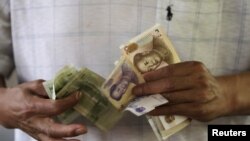China's policymakers are struggling with how to stimulate the economy at a time when there could be more than half-a-trillion dollars of bad debt.
Financial officials worry that injecting more money into the economy to try to spur growth could end up worsening the debt crisis, creating a so-called "liquidity trap" where the bank's stimulus efforts fail to achieve the desired result of spurring growth.
"This is a critical time for China. The central bank has denied there is a liquidity trap problem. But recent data indicate private companies are hoarding cash and not investing," Max Zenglein, research associate at the Berlin based Mercator Institute of China Studies said.
The government's solution to the problem is to push state-owned enterprises (SOEs) to increase investments in infrastructure and industrial projects. Banks are being asked to finance the new investment spree by SOEs.
"The government is trying to compensate this increasing investments by state-owned companies” Zenglein said adding, "I would imagine SOEs will be allowed to borrow more in order to finance the new investments".
He expects a continued increase in the pile of non-performing loans or bad debts of Chinese banks in the coming months.
Problem in the solution
Official statistics place the amount of accumulated bad loans at $317 billion. But independent analysts say the amount of non-performing loans (NPL) or bad debt may exceed half-a-trillion dollars if loans are evaluated strictly according to international standards.
This is besides another clutch of $754 billion worth of loans, which have been kept on a watch list because regulators fear that some may turn sour. In most cases, borrowers on these loans have defaulted on repayments and they are being rolled over in the hope of future settlement.
The amount of bad loans is expected to rise because the government is pushing state-owned companies, including "zombie companies" that have serious losses and have already defaulted on old loans, to take on more debt. Many of them are expected to default on new loans as well.
"Any government efforts to keep zombie borrowers afloat will prevent resources from flowing to more productive sectors, hurting potential growth," Julian Evans-Pritchard, senior economist with consulting firm Capital Economics, told VOA.
But the government is unlikely to accept this advice, and ask banks to offer more loans at lower interest to state-owned zombie corporations.
Many SOEs use their cheap loans to buy wealth management products, Xiang Songzuo, chief economist of the Agricultural Bank of China told Caixin, a local business publication.
Ostrich-like policy
"Banks and regulators are still reluctant to acknowledge the true scale of the bad loans and to deal with the problem head on. Indeed, the China Banking Regulatory Commission seems to be encouraging banks to ignore the problem by telling them to roll over loans for troubled companies," Evans-Pritchard said.
"The economic slowdown over the past couple of years is putting pressure on borrowers and causing defaults to rise," he said.
China's policymakers may be caught in a "Catch-22" situation. The government may also resort to the desperate measure of recapitalizing banks to avoid a credit crisis. "But this may result in higher government debt levels," Evans-Pritchard said.
Painful decision
Government efforts to get asset management companies to buy out toxic loans and dispose of them have proved to be very painful for the banks. They were able to recover just 32 percent of the value of loans in 2015. They had a recovery rate of 43 percent in 2014. The falling rate of recovery is a sign of a declining economy and refusal of asset management companies to take great risks.
Chinese asset management companies have become more market orientated and are demanding higher discounts on loans.
"This makes sense for the AMCs, especially given the weak outlook for China’s economy, but it does put greater pressure on banks’ capital," Evans-Pritchard said. "If defaults continue to rise, such low recovery rates may not be sustainable for the banks, which may require state support in order to overcapitalize".
Most of the non-performing loan disposal is being handled by four asset management companies created by the central government.
They are China Oriental Asset Management Corp., Cinda Asset Management Co., Huarong Asset Management Co. and Greatwall Asset Management Corp.
They provide a range of financial services like non-performing loan-backed securities, futures to other debt-linked derivatives, and some have obtained rights to land provided as collateral by borrowers to the banks in the first place, and used the rights to trade in the property market.




